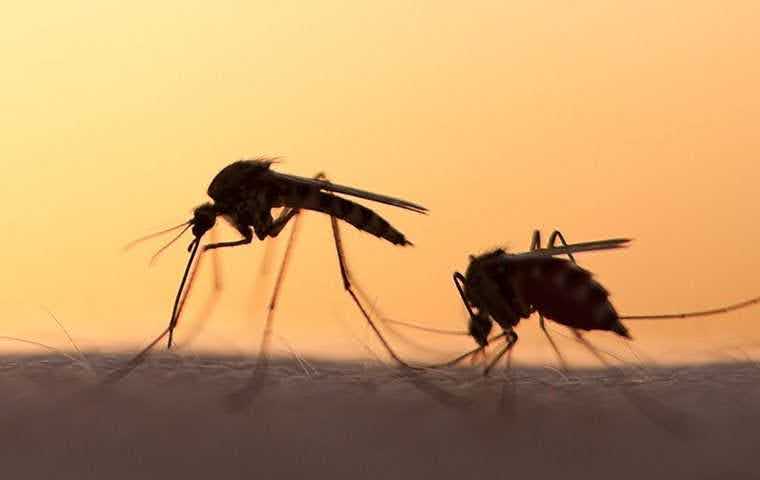These tiny insects can turn a pleasant evening on the patio into an itchy, uncomfortable experience. Beyond just being annoying, mosquitoes pose real health risks as carriers of diseases like West Nile virus, Zika virus, and other serious illnesses. The good news? You can take control of your outdoor space with some strategic mosquito prevention methods.

Why Mosquitoes Love Your Backyard
Mosquitoes are attracted to specific conditions. Understanding what draws them in is the first step to keeping them out:
- Standing water: Mosquitoes need water to breed. Even a bottle cap of water can become a nursery for mosquito larvae.
- Dawn and dusk activity: Most mosquito species are most active during early morning and evening hours.
- Carbon dioxide: The CO2 we exhale is like a dinner bell for mosquitoes.
- Body heat and odor: Mosquitoes can detect body heat and certain body odors from surprising distances.
- Dark clothing: Darker colors absorb heat and make you more visible to mosquitoes.
- Flowering plants and fruit: Male mosquitoes feed on nectar, so fragrant plants can attract them.
Eliminating Breeding Grounds: The Water Factor
The most effective way to reduce mosquito populations is to eliminate their breeding grounds. A female mosquito can lay hundreds of eggs in just a tiny amount of standing water, and those eggs can hatch in as little as 24-48 hours.
Water Sources to Check Weekly:
- Bird baths: Empty and refill at least once a week.
- Pet water bowls: If outside, refresh daily.
- Planters and saucers: Ensure they drain properly and don’t collect water.
- Children’s toys: Store them where they won’t collect rainwater.
- Tarps and covers: Position them so water runs off rather than pools.
- Gutters: Clean regularly to prevent clogs and standing water.
- Puddles and low areas: Fill in depressions in your yard where water collects.
- Decorative ponds: Stock with mosquito-eating fish or use circulation pumps.
- Unused pools: Cover or treat regularly.
- Old tires: Remove or drill drainage holes.
- Rain barrels: Cover with fine mesh screens.
Mosquitoes can use something as small as a discarded bottle cap to breed. This is why a thorough inspection is part of the overall residential pest control process.
Creating Mosquito Barriers
Strategic barriers can help keep mosquitoes away from your living spaces:
- Screen all windows and doors: Keep screens in good condition without tears or gaps.
- Use mosquito netting: For patios, gazebos, or play areas, mosquito netting provides an effective barrier.
- Create dry zones: A 5-foot gravel or mulch perimeter around sitting areas reduces mosquito resting spots.
- Install yellow “bug lights”: These don’t repel mosquitoes but attract fewer insects than standard bulbs.
Applying products containing essential oils, wearing light-colored, loose-fitting clothes that cover arms and legs, and timing your outdoor activities outside of peak mosquito seasons can also help avoid having to deal with getting bitten.
Seasonal Mosquito Prevention Calendar
Early Spring (March-April)
- Clean gutters and check drainage
- Repair window and door screens
- Remove debris that collected over winter
- Start weekly yard inspections for standing water
Late Spring/Early Summer (May-June)
- Deploy natural repellent plants
- Begin regular lawn maintenance
- Install fans in outdoor living areas
- Consider first professional treatment
Summer (July-August)
- Maintain vigilant water source checks during rainy periods
- Keep vegetation trimmed as growth accelerates
- Refresh repellent solutions more frequently in hot weather
- Continue professional treatments if using them
Fall (September-October)
- Clean up fallen leaves regularly
- Prepare water features for winter
- Store outdoor equipment properly
- Final professional treatment before winter
Professional Treatment Options
When looking for a mosquito control company, look for providers that offer:
- Conduct thorough inspections to identify breeding grounds
- Target both adult mosquitoes and larvae
- Offer recurring service throughout mosquito season (typically April through October)
- Provide guarantees for their treatments
- Use products that are safe for families, pets, and beneficial insects
- Focus on natural ingredients when possible
Community Efforts
Mosquito control works best when entire neighborhoods participate. Consider gathering your neighbors and following these community approaches:
- Share information with neighbors about the breeding site elimination
- Organize community cleanup days for public areas
- Report abandoned properties with standing water to the local authorities
- Support local mosquito control programs
Between physical barriers, using natural repellents, considering professional help, and eliminating breeding sites on and off your property, you can keep mosquito populations in your area low for the entire year.
Final Thoughts
Enjoying your backyard shouldn’t require battling swarms of mosquitoes. With consistent prevention efforts focused on eliminating breeding grounds, you can dramatically reduce mosquito populations around your home.
Remember that mosquito control is an ongoing process. You can’t just expect mosquitoes to avoid your property and let you enjoy the outdoors after you have applied protective measures once.
By incorporating these practices into your regular yard maintenance routine, you’ll create a more comfortable outdoor space while protecting your family from mosquito-borne illnesses.The most effective approach is a combination of multiple strategies. Start with the simplest solution, then follow up with professional pest control services and build your mosquito defense from there.


